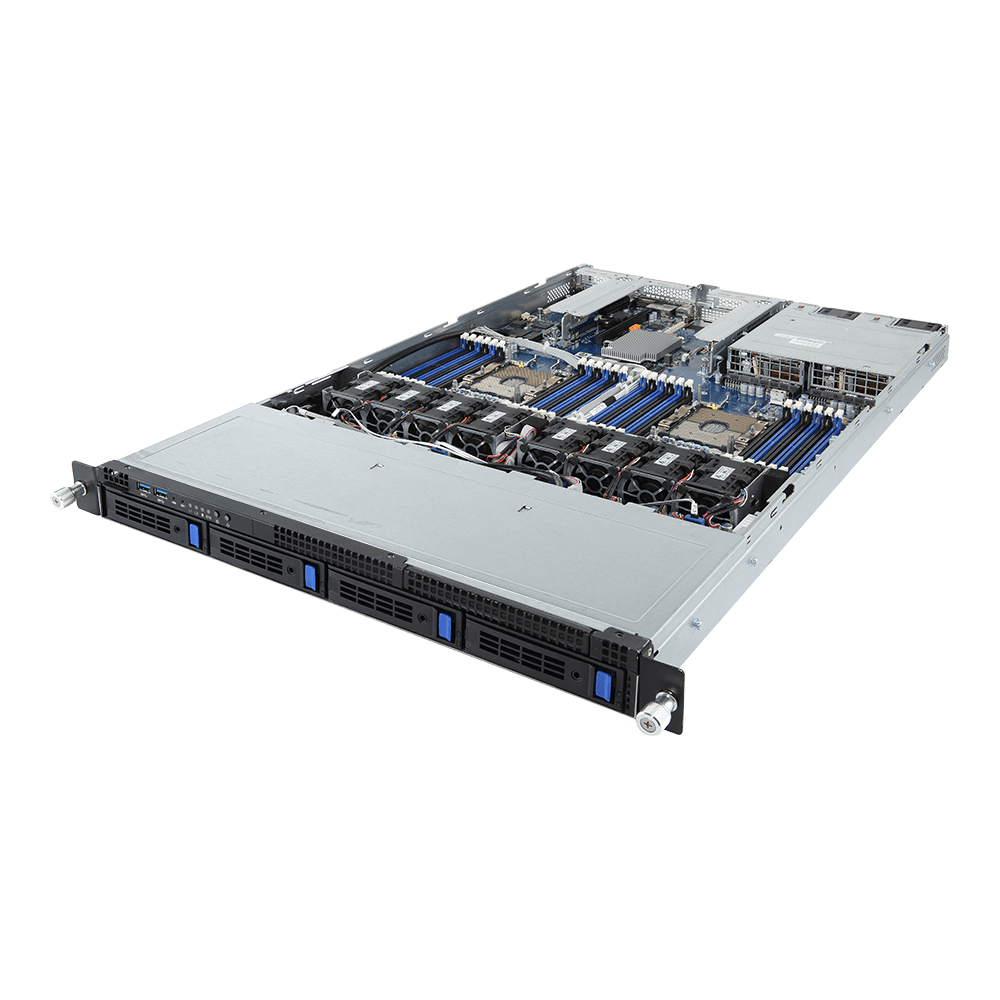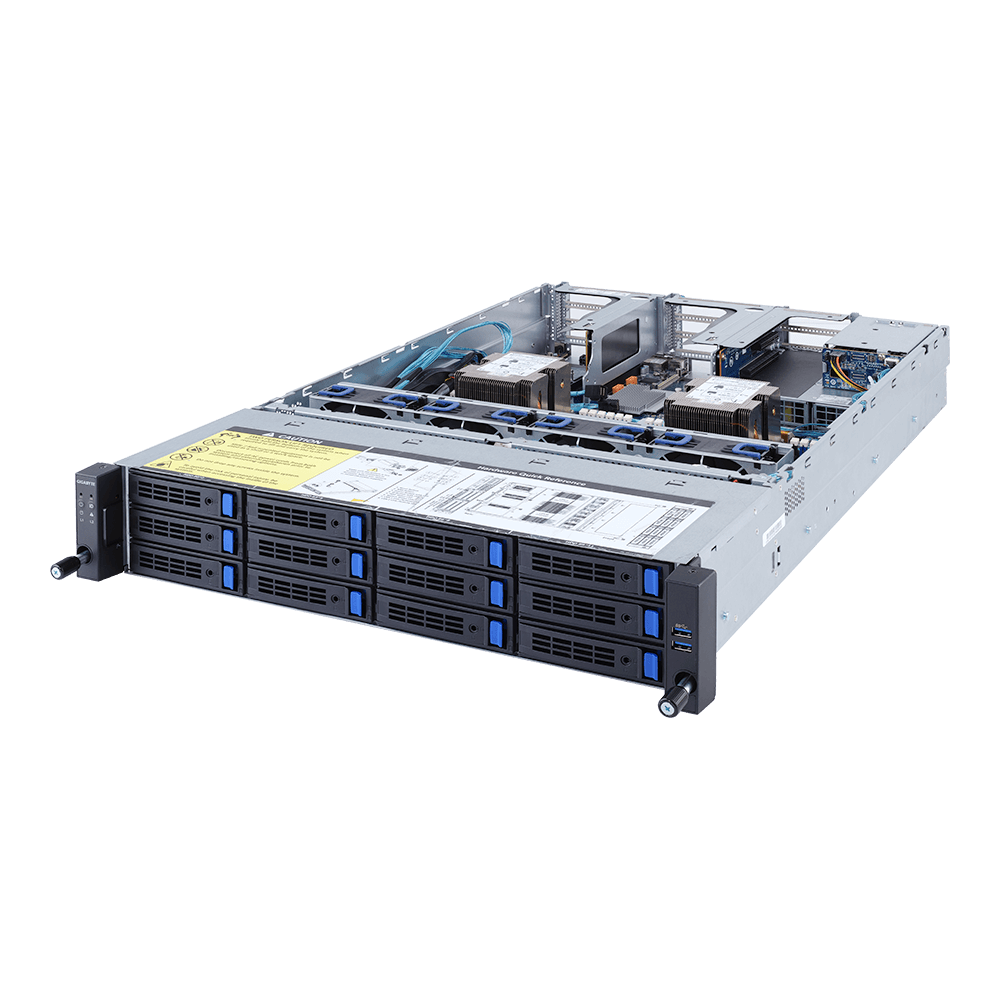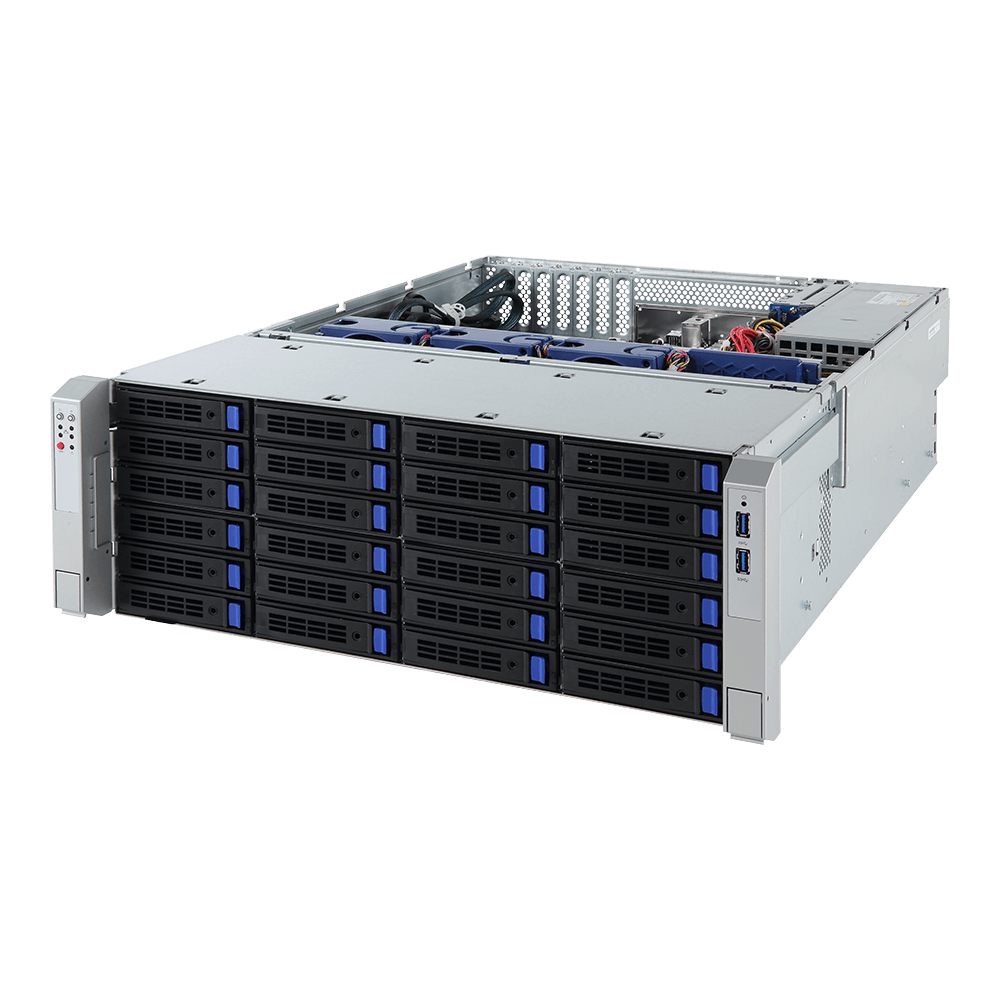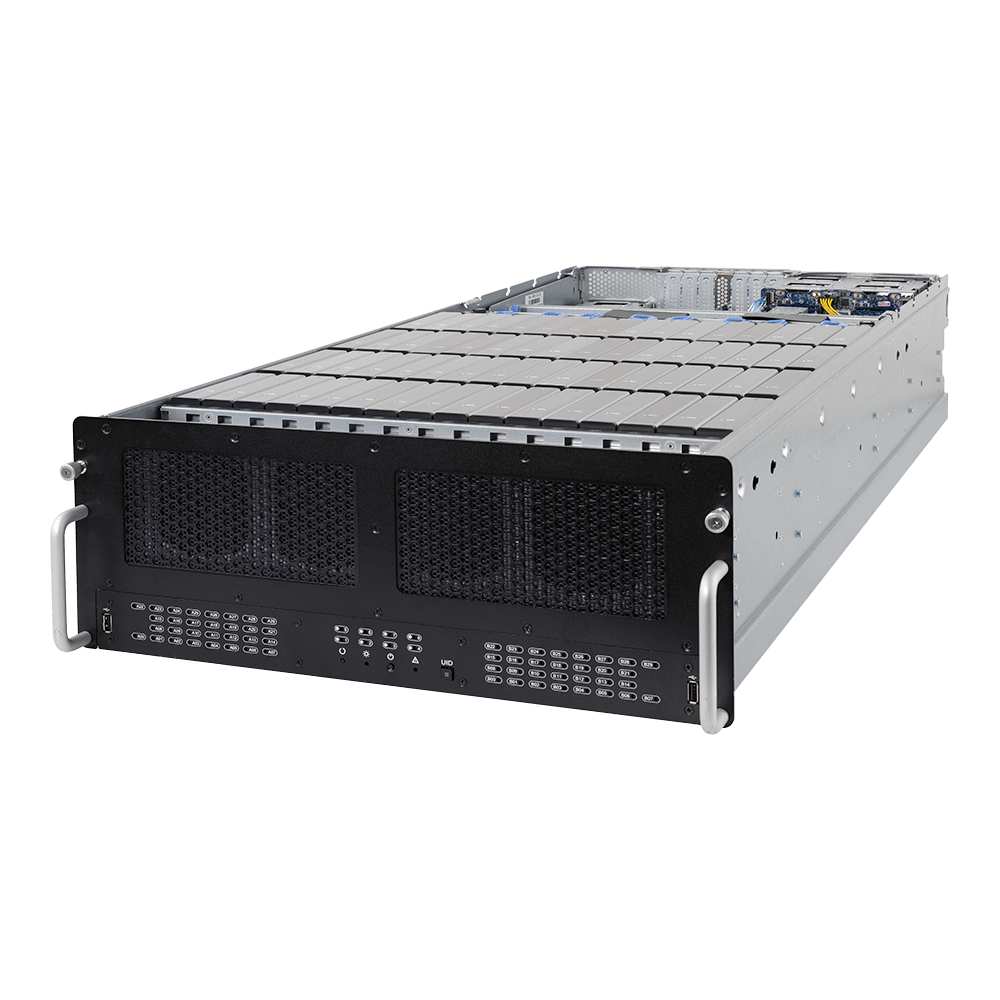VirtualStor™ Scaler
GIGABYTE has joined forces with Bigtera to offer a high performance scale-out software defined storage solution: VirtualStor™ Scaler.
Introduction
GIGABYTE has joined forces with Bigtera to offer a scale-out software defined storage package: VirtualStor™ Scaler, that can allow you to eliminate over-provisioning, bring resource costs under control, and avoid capacity planning headaches. GIGABYTE servers have been fully validated and tested with VirtualStor™ Scaler to offer a complete hardware / software turnkey appliance package that is ready for fast and easy deployment into your data center.
VirtualStor Scaler Use Case Scenarios
Media & Broadcasting Industry
Different media processes across workflows demand different storage protocols, performance & availability characteristics. In addition, the rise in demand for high definition and 4K video is also placing pressure on storage capacity & scalability. VirtualStor Scaler can solve both these pain points and has been adopted by several broadcasters in mainland China to meet their storage needs.

Electronic Design Automation (EDA)
A global leader in IC design uses VirtualStor Scaler as a multi-tenant scale out NAS. Real-time data is replicated between 3 data centers, to ensure the company's EDA applications are able to run across 3 sites with the same project data. Even if one building is entirely shut down, EDA applications will still run by accessing the project data in the other data center.

On-Premises Cloud Storage
Distributed by nature and using a native block storage architecture with support for multiple storage protocols, VirtualStor Scaler is ideal to be used as the backend storage system for on-premises cloud infrastructure. It can scale out without limitation to provide multi-petabyte capacity, and has support for Amazon S3 protocols so extra capacity in the public cloud can be used on demand.

Challenges
My Data is Growing but My IT Budget is Not
Currently there are several pressing concerns facing IT administrators,
with the foremost being rapid data growth, rapid response to storage
requests, and finding a cost effective efficient solution to handle their
infrastructure's needs. While the amount of data that businesses are
generating is ever increasing, IT budgets are not keeping pace with what
traditional storage would cost to facilitate handling big data. Traditional
storage solutions scale up which means that heavy investment and
massive over provisioning is the solution to capacity planning.
Storage Islands: Wasting Time & Resources
Over time data centers can become a mix and match of many different types of storage platforms and devices: such as SAN, NAS, or Object Storage. This is due to budgets, availability of storage devices, immediate resource needs, and storage requirement needs. For example, a company in the media and broadcasting industry performs many different kinds of processes, such as collection, editing, broadcasting, archiving and content management. Different processes demand different characteristics for storage, such as protocols, performance and availability, and over time the company will implement different storage technologies and platforms across their workflows. This will produce a negative effect of creating "islands" or "silos" of different storage platforms, where the same data used in different stages of a workflow must be manually copied between each storage platform, increasing workflow complexity, duplicating data, and wasting time and resources.
The Solution: VirtualStor™ Scaler
Only Buy Capacity When You Need It
As software defined storage, VirtualStor™ Scaler scales out to increase
capacity. More capacity can be effortlessly added simply by adding more VirtualStor Scaler appliances, which seamlessly become part of the single massive decentralized storage entity.

Scale up and Scale Out storage
Unify & Eliminate Your Storage Islands
VirtualStor Scaler is able to unify different storage platforms and devices, consolidating any type of traditional storage (SAN, NAS, and DAS) into a single massive storage entity, with Bigtera's unique storage virtualization technology.
VirtualStor Scaler can be configured into storage of any type by abstracting the storage hardware from the control layer, and supports network attached storage (NAS) and storage area networks (SAN) that can run simultaneously. These storage types are supported by several storage protocols: iSCSI / FC (SAN), CIFS / NFS (NAS), and Amazon S3 / OpenStack Swift / OpenStack Cinder RBD (Object Storage).
These different storage systems – now virtually aggregated – can then be easily managed and monitored through a single dashboard, reducing management complexity and operation costs.

Bigtera VirtualStor Software-Defined Storage (SDS) P{latform
Squeeze Out Maximum Capacity from Your Investment
VirtualStor™ Scaler can use RAID-5 together with two replica copies or N+M Erasure Coding, so as to provide more efficient space utilization than other software defined storage with 3 replica copies. Administrators can also assign various services on Bigtera's unique multi-tenant storage technology "Virtual Storage" to virtually extend the available space, and enable compression and data deduplication for backup or archiving. VirtualStor™ Scaler also automates efficient optimization of storage resources: Thin Provisioning functionality provides resources just as they are needed, and storage resources are balanced across storage nodes so no single node carries more than their fair share of the load.
VirtualStor™ Scaler also optimizes SSD usage, using a new generation of algorithm optimization techniques to minimize SSD write amplification, reducing write wear and extending SSD service lifetime. VirtualStor™ Scaler can also notify the administrator when SSD life is running out, and predict storage capacity and performance. These features help an administrator to plan ahead and decrease management headaches.

Bigtera SDS vs. Open Source SDS Platform
Break Through Bottlenecks for High Performance
VirtualStor™ Scaler features a high-performance back-end storage engine – BigteraStore – that significantly increases the I/O performance of a distributed storage system by using SSD to support cache and log storage for random I/O, breaking the bottleneck of scale-out storage systems that are traditionally not good at handling random reads.
VirtualStor™ Scaler also features SSD acceleration technology such as data caching and merging small I/Os into sequential I/Os to further improve IOPS. Running on GIGABYTE server hardware, featuring Intel® Xeon® Scalable processors and 10GbE to 100GbE network connectivity to maximize the compute and networking resources required for high I/O and throughput, VirtualStor™ Scaler brings blazing fast scale-out storage to your data center.
VirtualStor™ Scaler also features SSD acceleration technology such as data caching and merging small I/Os into sequential I/Os to further improve IOPS. Running on GIGABYTE server hardware, featuring Intel® Xeon® Scalable processors and 10GbE to 100GbE network connectivity to maximize the compute and networking resources required for high I/O and throughput, VirtualStor™ Scaler brings blazing fast scale-out storage to your data center.

Read and Write Comparison: Bigtera SDS vs. Open Source SDS
100% Protection & Availability for Peace of Mind
VirtualStor™ Scaler data availability functions include data replication, erasure coding, self-repairing, and RAID features. Erasure coding offers administrators an alternative to data replication, to ensure that there is no single point of failure for any of the data blocks. VirtualStor™ Scaler uses round-robin DNS and IP takeover services. Round-robin DNS uses a list of IP addresses for workload balancing: if any of the appliances encounter issues, the remaining appliances take over application and workload services seamlessly by taking over the IP of the appliance that encounters issues. VirtualStor™ Scaler object storage can support Server Side Encryption (SSE) to protect the object data stored with S3 API, and uses Intel® AES-NI encryption technology to accelerate Server Side Encryption (SSE). Encryption can be enabled for critical data or applications, while data that has a lower level of confidentiality can be left unencrypted.

VirtualStor Scaler Architectural Overview
Consolidate Legacy Systems With Seamless Migration
Users can utilize VirtualStor™ Scaler to unify and extend the capacity of their existing storage systems, or can seamlessly migrate data from their legacy storage devices to build a new storage system almost without any service downtime. Users can set up a new VirtualStor™ Scaler storage system with as little as 3U of rack space and 48TB of storage capacity, or can scale out to achieve multi-petabyte storage capacity.
VirtualStor Scaler UI Operation Demonstration
Comparison with Traditional/Scale-up NAS
Bigtera VirtualStor™ Scaler |
Traditional/Scale-up NAS | |||
|---|---|---|---|---|
| Scale-out architecture with SAN/NAS/Object multiple protocols in one cluster | Traditional scale-up architecture with limited storage protocols | |||
| Cost-effective. Supports standard X86 infrastructure and mainstream HDD and SSD. | Hardware vendor lock-in. Only supports specific hardware, HDD and SSD. | |||
| Minimizes write amplification and offers much longer SSD lifespan with Bigtera storage I/O engine | Huge write amplification. SSDs easily wear out. | |||
| Performance and capacity both scale-out. Performance is truly linear & predictable. | Scale-up capacity only. Performance bottleneck at scale. | |||
| Consolidate existing storage together with all flash. Seamlessly migrate old data to save TCO. | Only can store data. Not able to migrate or consolidate existing storage. Not able to be the cache layer for existing storage. | |||
Bigtera VirtualStor™ Scaler vs. Open Source SDS
Bigtera VirtualStor™ Scaler |
Open Source SDS | |
|---|---|---|
| Supports SAN protocols | iSCSI and FC | iSCSI only |
| Supports NAS protocols | NFS and CIFS | NFS only and still in tech preview |
| Supports file access protocols to bucket | NFS and CIFS | NFS only and still in tech preview |
| Supports WebDAV | ||
| API which is compatible with Amazon S3 and OpenStack Swift | ||
| OpenStack integration | ||
| Multi-Tenant Storage | ||
| Seamless data migration from legacy storage | ||
| Consolidate legacy storage space | ||
| QoS policy for file, folder, and volume | ||
| Folder quota / volume quota policy | ||
| Deployment | No need for any extra monitor nodes | Need to install 3~7 extra monitor nodes |
| Data deduplication | ||
| Data compression | ||
| Real-time replication | ||
| N+M erasure coding | ||
| Snapshot and cloning | ||
| Self-repairing | ||
| Load rebalancing | ||
| Recovery optimization | Incremental Recovery and Recovery QoS | |
| Supports VAAI | ||
| ISO installation package | ||
| Decentralized management console | ||
| Remote backup |
|
Only bucket to bucket |
| Cloud backup to Amazon S3 compatible service | ||
| Open management API | ||
| Windows AD integration | ||
| SSD optimization |
|
Just supports SSD and not optimized for SSD characteristics |
| Capacity and performance prediction | ||
| Multiple file systems | ||
| Notification support | Email, SNMP, (WeChat) | |
| Backup system configuration | ||
| iSCSI/FC initiator groups | ||
| Rack awareness |
Maximize your storage efficiency using software-defined storage
Products
Related Technologies
Software Defined Storage ("SDS") refers to the virtualization of storage systems, whereby the underlying storage hardware is abstracted from the storage software that manages it. SDS can be an element with a Software Defined Data Center or it can also function as a stand-alone technology. The software enabling the storage-defined storage environment may also provide policy management for features such as data de-duplication, replication, thin provisioning, snapshots and backup.
To scale horizontally is to scale out or in, and is defined as to add more nodes to or remove nodes from a system in a server, such is also explained as adding new computers to a distributed software application.
To scale vertically is to scale up or down, and is defined as to add more resources, such as CPUs, memories, or GPUs, to nodes in a system. Such vertical scaling of existing systems also enables virtualization technology to be more effective, as it provides more resources for the hosted set of operating system and application modules to share.
Bring Your Ideas Faster to Fruition
Email Sales




































